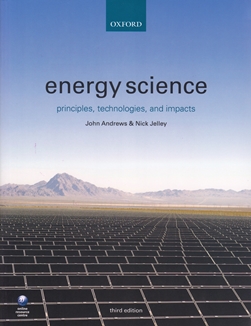 It was not entirely coincidental that this book dropped through my letterbox a day after the latest G20 conference ended. I was already in need of a reliable scientific update on where we stand on global warming. The situation changes fast, these days.
It was not entirely coincidental that this book dropped through my letterbox a day after the latest G20 conference ended. I was already in need of a reliable scientific update on where we stand on global warming. The situation changes fast, these days.
And here I have it, with a cover displaying a brick wall (of solar panels) leading up to a bare, mountainous horizon. An implication of global extinction, I assume. Inside, a framework of physics, mathematics and financial analysis delivers a heady excess to the brain. The book is well laid out, dressed with the latest statistics and each chapter embalmed with a short summary, recommendations for further reading and a set of exercises (answers at the back). Compared with the 2013 edition, this new edition has been comprehensively revised and is 100 pages (20%) longer.
The authors’ terminal sentence is disturbingly vague. It reads thus: ‘Currently, the rise in long term temperature may be limited to 2.7 degrees C by 2100, but only by enacting all the intended contributions of the nations announced in the Paris Agreement in 2015’. That is a hefty ask, particularly as these nations need to deal with a whole range of other (often unpredictable) issues as well. And decidedly more difficult to do now that a new inward-looking, unpredictable, US president has refused to reaffirm that 2015 agreement.
The content of this book is focused on a minority group: scientists. For me, reading it was like ploughing through a field of glutinous mud, full of sticky formulae and arresting acronyms (a loose page re-expanding all those puzzling acronyms would help). Cutting a satisfactorily straight comprehension furrow is tricky and tiring. It’s worth the effort in the end, but it’s no more accessible to the general public than the man in the moon.
That means we must do more to win over the public and their political representatives, and lead them to understand our logical, scientific, point of view. Just replacing the cover design with a copy of Edvard Munch’s dramatic ‘The Scream’, is tempting, but simply won’t do. We need to re-express the essence of this work in simpler language. The matter is too important to permit uninformed dissent. Perhaps, like Mrs Bucket (sorry, ‘Bouquet’), we should sing more at the unconverted than with them. Short of creating a scientific meritocracy, that’s all we can do.
Reviewed by David Edwards
Energy Science: Principles, technologies, and impacts by John Andrews & Nick Jelley (3rd Edn). 2017. Oxford University Press ISBN-13: 978-0199281121 344pp (sbk). List Price £39.99. W: https://global.oup.com/ukhe/product/energy-science-9780198755814?cc=gb&lang=en&